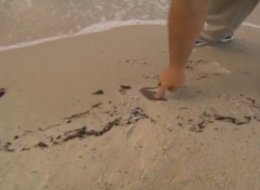Great analysis from David Leonhardt of the
New York Times on the nature of risk - and the oil spill - a must read - David
May 31, 2010
Spillonomics: Underestimating Risk
By DAVID LEONHARDT
In retrospect, the pattern seems clear. Years before the Deepwater Horizon rig blew, BP was developing a reputation as an oil company that took safety risks to save money. An explosion at a Texas refinery killed 15 workers in 2005, and federal regulators and a panel led by James A. Baker III, the former secretary of state, said that cost cutting was partly to blame. The next year, a corroded pipeline in Alaska poured oil into Prudhoe Bay. None other than Joe Barton, a Republican congressman from Texas and a global-warming skeptic, upbraided BP managers for their “seeming indifference to safety and environmental issues.”
Much of this indifference stemmed from an obsession with profits, come what may. But there also appears to have been another factor, one more universally human, at work. The people running BP did a dreadful job of estimating the true chances of events that seemed unlikely — and may even have been unlikely — but that would bring enormous costs.
Perhaps the easiest way to see this is to consider what BP executives must be thinking today. Surely, given the expense of the clean-up and the hit to BP’s reputation, the executives wish they could go back and spend the extra money to make Deepwater Horizon safer. That they did not suggests that they figured the rig would be fine as it was.
For all the criticism BP executives may deserve, they are far from the only people to struggle with such low-probability, high-cost events. Nearly everyone does. “These are precisely the kinds of events that are hard for us as humans to get our hands around and react to rationally,” Robert N. Stavins, an environmental economist at Harvard, says. We make two basic — and opposite — types of mistakes. When an event is difficult to imagine, we tend to underestimate its likelihood. This is the proverbial black swan. Most of the people running Deepwater Horizon probably never had a rig explode on them. So they assumed it would not happen, at least not to them.
Similarly, Ben Bernanke and Alan Greenspan liked to argue, not so long ago, that the national real estate market was not in a bubble because it had never been in one before. Wall Street traders took the same view and built mathematical models that did not allow for the possibility that house prices would decline. And many home buyers signed up for unaffordable mortgages, believing they could refinance or sell the house once its price rose. That’s what house prices did, it seemed.
On the other hand, when an unlikely event is all too easy to imagine, we often go in the opposite direction and overestimate the odds. After the 9/11 attacks, Americans canceled plane trips and took to the road. There were no terrorist attacks in this country in 2002, yet the additional driving apparently led to an increase in traffic fatalities.
When the stakes are high enough, it falls to government to help its citizens avoid these entirely human errors. The market, left to its own devices, often cannot do so. Yet in the case of Deepwater Horizon, government policy actually went the other way. It encouraged BP to underestimate the odds of a catastrophe.
In a little-noticed provision in a 1990 law passed after the Exxon Valdez spill, Congress capped a spiller’s liability over and above cleanup costs at $75 million for a rig spill. Even if the economic damages — to tourism, fishing and the like — stretch into the billions, the responsible party is on the hook for only $75 million. (In this instance, BP has agreed to waive the cap for claims it deems legitimate.) Michael Greenstone, an M.I.T. economist who runs the Hamilton Project in Washington, says the law fundamentally distorts a company’s decision making. Without the cap, executives would have to weigh the possible revenue from a well against the cost of drilling there and the risk of damage. With the cap, they can largely ignore the potential damage beyond cleanup costs. So they end up drilling wells even in places where the damage can be horrific, like close to a shoreline. To put it another way, human frailty helped BP’s executives underestimate the chance of a low-probability, high-cost event. Federal law helped them underestimate the costs.
In the wake of Deepwater Horizon, Congress and the Obama administration will no doubt be tempted to pass laws meant to reduce the risks of another deep-water disaster. Certainly there are some sensible steps they can take, like lifting the liability cap and freeing regulators from the sway of industry. But it would be foolish to think that the only risks we are still underestimating are the ones that have suddenly become salient.
The big financial risk is no longer a housing bubble. Instead, it may be the huge deficits that the growth of Medicare, Medicaid and Social Security will cause in coming years — and the possibility that lenders will eventually become nervous about extending credit to Washington. True, some economists and policy makers insist the country should not get worked up about this possibility, because lenders have never soured on the United States government before and show no signs of doing so now. But isn’t that reminiscent of the old Bernanke-Greenspan tune about the housing market?
Then, of course, there are the greenhouse gases that oil wells (among other things) send into the atmosphere even when the wells function properly. Scientists say the buildup of these gases is already likely to warm the planet by at least three degrees over the next century and cause droughts, storms and more ice-cap melting. The researchers’ estimates have risen recently, too, and it is also possible the planet could get around 12 degrees hotter. That kind of warming could flood major cities and cause parts of Antarctica to collapse.
Nothing like that has ever happened before. Even imagining it is difficult. It is much easier to hope that the odds of such an outcome are vanishingly small. In fact, it’s only natural to have this hope. But that doesn’t make it wise.
David Leonhardt is an economics columnist for The Times and a staff writer for the magazine.
Originally published
Spillonomics - Underestimating Risk - NYTimes.com
++++++++++++++++++++++
![]() Image via CrunchBase
Image via CrunchBase
![]() Image via CrunchBase
Image via CrunchBase
 Image via Wikipedia
Image via Wikipedia
 Image via Wikipedia
Image via Wikipedia